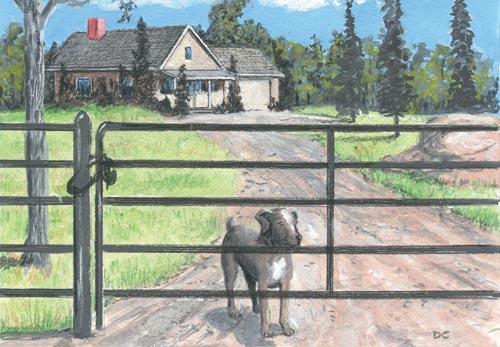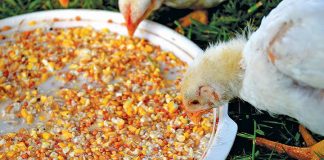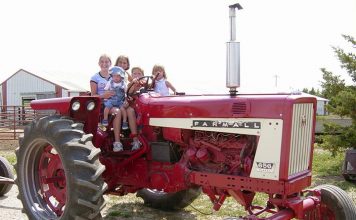| Issue #143 • September/October, 2013 |
In these tough economic times, many women are finding themselves alone for long hours on the homestead. As local jobs disappear, the major breadwinner may take a job with a long commute, leaving the wife and kids to run the farm. I know several farm women whose husbands are long distance truckers, and another has a husband in the military. Some women have found their place in the country and are starting out alone; others have lost their husbands due to death or divorce. In these instances, the women must provide security for the homestead.
If you find yourself in this position, have a stern talk with yourself. Are you up to the challenge? Most women depend on a man to keep them safe, and our society encourages this by viewing women alone as prey. We expect a boyfriend or a husband to make sure that the wolf stays far from the door. I tell my own sons that it is part of a man’s job to protect the women in his life.
It is easy to forget that this nation was built by the strength of women as well as men. The following thoughts and advice may help a woman who discovers that she has been promoted to head of security.

Make your place an unattractive target
Make it harder or more time consuming for someone to break in. The priority should be to slow a burglar down so much that he looks elsewhere for an easier target.
First, fence around your home and buildings, especially between your home and the road. Keep passersby as far from your house as possible, both to cut down on dealing with strangers and to keep people from casually observing what you own. In our area, a common tactic for strangers to gain access is to be “lost” and ask for directions. In the fall, armed men roam the back roads and sometimes show up at isolated farms claiming to have permission to hunt. Some truly are hunters hopelessly turned around. Others are thieves looking for easy pickings and programming locations into their GPS for future reference. Keep these sorts off of your place by fencing them out and installing a sturdy gate locked with a hardened chain and heavy padlock.
Another idea to help deter people from driving close to your buildings is to park junk equipment along your fence line. Instead of selling that broken baler for scrap, why not park it along your fence line to prevent people from simply cutting your fence and driving through? The bigger and rustier the junk the better. What? Some thieves tried to drive around your gate and ran over a mower blade unseen in the tall grass and punctured all four tires? Darn the bad luck. A couple of small signs attached to your fence warning about copperheads and rattlesnakes wouldn’t hurt, either. Just make sure your junk really is junk or someone might steal it, too.
If you can afford to do so, install security cameras. They may not stop a thief, but they may take a good enough photo to identify and track the perpetrator down. If the homestead has a long driveway, a driveway alarm that sets off a chime in the house when a vehicle passes by will alert the household that someone is coming. There are many such products on the market, limited only by your pocketbook. If you have the money and like gadgets, some of them may be good investments.
Installing motion detector lights is money well spent. They can be adjusted so that the family pets don’t set them off. I love ours when coming home after dark and the porch light flips on automatically, illuminating the entire front yard and eliminating dark corners. Another benefit is that I don’t worry nearly so much about getting a snake bite on the way to the door.
Install good locks and deadbolts on all exterior doors of your home, and use them. It is a good idea to lock the house if you are outside, but not within sight of the house. You don’t want to return from berry picking to find that someone has made themselves at home. Also, lock the doors if noisy equipment like the vacuum is being used. An elephant could come through the door while the average woman is vacuuming and she wouldn’t know it until it tapped her on the shoulder with its trunk, so lock those doors. Before bed at night conduct a perimeter check of all ground floor doors and windows to ensure that all are closed and locked.
Don’t forget about safeguarding equipment. It is often a mistake to leave valuable equipment such as tractors or trailers within sight of a road. We found this out the hard way after losing a nice 16-foot trailer. An acquaintance lost a tractor even though he had removed the battery. The thieves brought their own battery and drove the tractor out of the hay field and onto a waiting trailer. Don’t leave the keys in any equipment, no matter how far back in the woods you are. That’s an invitation criminals will be happy to accept. Lock up; or chain up; small equipment such as lawn mowers, chain saws, and especially ATVs.
Some people will steal anything. In our area, it has become common for thieves to steal air conditioning units for the copper, and even tear the plumbing out of walls in unattended homes. In a bad economy these types of crimes worsen. I once worked with a man who lived in a crime-ridden part of town who said that he knew men who would do anything for $10; a sobering thought.
Will deadbolts, window locks, and strong gates keep a determined criminal out? No. But they will cause the bad guys to make noise and slow them down, perhaps long enough for the householder to call reinforcement and go for the guns. Look at it this way; if someone has just opened a gate with bolt cutters, or bypassed the gate by mowing down two fences, he isn’t coming to buy farm fresh eggs. His intentions are quite clear, aren’t they?
Keep dogs

A dog is an early warning device, a deterrent to intruders, and a loyal friend.
In my opinion, a woman in the country absolutely must have a dog, preferably a big one. Two big dogs are even better than one because a dog is braver if he has a buddy. When we had only one dog, the coyotes and bobcats would come right up to the yard fence at night. Our dog would bark, but seemed unwilling to charge into a pack of coyotes. This changed after a suitable canine companion was acquired. Working as a team, both of our dogs are quite comfortable rushing headlong into a pack of their wild cousins. If we lived in bear or mountain lion territory, we might keep really big dogs with a hunting or guarding ancestry. We might also keep three or four of them to up the odds that one might still be standing after trying to drive a really big kitty away from the goat barn.
The homestead dog performs three jobs in a defensive situation. First and foremost, he is an early warning device. A dog’s sense of smell and hearing are extraordinary, and he can see in the dark better than a human. If anything or anyone is within their sphere of influence, the dogs will know about it far sooner than we will. A good dog will be ready to do something about it immediately. Our dogs can be lying in the driveway looking like roadkill, and then suddenly leap to their feet and race to the gate, barking and snarling. Sure enough, several minutes later, a vehicle that no one heard approaching will arrive.
The second defensive job a dog performs is confronting intruders. A dog that knows what’s his and is willing to defend it is far superior to a dog that simply barks. This is why I’m in favor of large dogs for the country woman. Experts say that the size of the dog is unimportant, that even a small dog can be deterrent. That’s true in the city. I once knew of a nine-pound Miniature Schnauzer that saved his owner’s backside by hanging from a home invader’s pant leg. The little dog was kicked like a soccer ball several times across the apartment, but pressed the attack long enough for his owner to escape and call 911 from an apartment down the hall. However, in rural areas the response time of law enforcement can be measured in hours, if they choose to respond at all.
Ladies, in the country, size does matter. A dog weighing seventy pounds or more can be a deterrent, and he is capable of doing a lot of damage in a short amount of time. It seems to be a sad truth that many bad guys are more afraid of a dog than they are of a woman with a gun in her hand. A criminal may be thinking that a woman doesn’t know how to shoot a gun, or that she won’t shoot, or even that she can’t hit anything if she tried. But a couple of large dogs at your side strenuously voicing objections, circling around, and coming in behind the threat can be disturbing enough to give even determined men second thoughts about wrongdoing. The proper homestead dog will be saying very clearly through his aggressive actions, “Not on my watch.”
What if the folks in your driveway are harmless, like the Ladies’ Quilting Society out recruiting new members? Then apologize profusely and say something offhand like, “Oh, I am sorry. My dogs are extremely protective and really dislike strangers. Good thing I was here to drag them off.” That statement could even be a big fat lie, but they won’t know that. Word will get around that the family at the end of the road has a pack of barely controllable hounds from Hades.
Lastly, a dog willing and able to engage a threat can buy his family valuable time to escape or deploy weapons. Pay attention to your dogs; if they sound the alarm, investigate. If the dogs bark ferociously at night and then suddenly stop, assume one of three things has happened. The intruder has left. It’s not an intruder but someone you know and your dogs are now happily greeting them. Or, it is an intruder who has done great bodily harm to Fido and Spot. Hope for the first two scenarios, but be prepared for possibility number three.
Take care of your dogs. Train them to come when called and to sit and stay. Teach them to walk quietly on a leash and to ride in a vehicle. Make sure they get vaccinated with rabies and distemper vaccine every year. If your dog bites someone, law enforcement may arrive and demand to see proof of vaccination, as well as require the animal to be quarantined.
My comments on dogs are meant for women living on isolated homesteads where big aggressive dogs are unlikely to run into trouble with traffic, repairmen, delivery people, or stray children. If your dog bites someone, even while defending you, you can be sued and perhaps be financially devastated. Your faithful canine can be declared “dangerous”; especially if he has defended you in an effective manner, leaving you on shaky legal ground and your dog’s future uncertain. People are innocent until proven guilty, but Fido has no such entitlement. The worst violent offenders can be cleaned up and look innocent in court. By contrast, your loyal hound with a bloody muzzle and some dude’s tattered pants in his mouth is clearly guilty. Don’t expect any sympathy from responding officers or the court. The response you are more likely to receive is, “For crying out loud, lady. What the heck were you doing out there all by yourself, anyway?” The homestead invader may be four-legged instead of two. Your dogs may try to drive away something bigger and more ferocious and die in the attempt. Keep firmly in mind that if your dog defends you with his teeth, he may pay for it with his life. Bury him with honor.
Stay out of feuds
If you are in the middle of a feud between locals, or if you started one, get out of it immediately. You can’t afford to be drawn into unpleasantness, so don’t make yourself a target by engaging in angry aggressive behavior with anyone. Sometimes odd things set people off and minor difficulties turn into long-standing hostilities. I once lived in an urban area where arguments over a parking space nearly turned four intelligent, well-educated people into homicidal idiots. In suburbia, the average stay in a house is about five years, so people think that they don’t have to get along with their neighbors. In rural areas, people often stay on a place for decades, even generations. So it is of utmost importance to remain on good terms with neighbors.
If a property line is in dispute, ask the neighbor to pay half on a survey and have the problem fixed. Is livestock getting out, yours or theirs? Fix your fences to keep your animals where they belong and keep other people’s livestock off of your place. If someone complains that your kids are trespassing, accept full responsibility and teach your children to stay on your own farm. My family has permission to be on several adjoining farms, and I renew this permission annually by speaking to the owners directly. Even so, we absolutely stay off of other farms during deer season unless we are after a downed deer. This also applies to friends and relatives who have permission to hunt our farm. We make sure our guests know where our property lines are and that they stay within them.
What does this have to do with homestead security? Neighbors often know more about you than you realize: your schedule, who lives in your house, even what you own. Neighbors can become crucial allies when treated fairly and respectfully. One of the easiest ways to get along is to mind your own business and let other people mind theirs. Don’t pass along gossip unless you are positive it is true (and maybe not even then). You want to be known as the family that does things for themselves, so work hard and don’t ask for help very often. Be willing to help others when you can. It is comforting to know that in an emergency, neighbors will arrive to help because they like you, not because they are obligated.
Be armed
If your state allows citizens to carry a concealed firearm, get a permit to do so. Maybe you are thinking that you’re not very interested in firearms, plus, you don’t want to go to the expense of owning and operating them, so you will just trust in the overall goodness and decency of humankind. Of course, that is your choice, but I don’t share that sort of optimism. A woman living in an isolated area is foolish if she isn’t armed. As previously mentioned, the response time for law enforcement in rural areas is horrendously slow due to long distances, poorly paved secondary highways, gravel roads, and weather. I can’t stress this enough: if you run into trouble in a remote area, you must solve the problem yourself. Whether the predator is four-legged or two-legged, the act of physically defending yourself, your children, your livestock, and your home rests with you.
Once you acquire a carry permit, I suggest that you keep your firearm concealed even if you aren’t legally required to do so. The element of surprise is intimidating. The first time a bad guy realizes a woman is armed should be when he is looking down the business end of her barrel. Seeing an obviously armed woman also scares people and sometimes causes unnecessary rumors. While your neighbors may agree in principle with your right to be armed, they may be offended that you are armed in their presence. They might speculate endlessly about what you are so afraid of. Whether a woman is armed or not is no one’s business but hers, so keep that weapon concealed. Handguns and spare ammo weigh quite a bit, and it may require rethinking your wardrobe. But a firearm won’t help you if it’s locked in a safe and you need it right this second.
When you have decided to make a firearm part of your everyday life, you must gain the skills to use one proficiently. It takes thousands of rounds to become adept with a handgun, so buy a gun that you can afford to shoot, and then shoot almost every day. Acquire skills with long guns, also. Every homestead woman should own a .22 rifle for varmint control, small game hunting, and dispatching livestock. I also feel that she should have a shotgun, either a 20 gauge or a 12 gauge, and be skilled in its use.
Teach your children to shoot. The best way to ensure that kids are safe around firearms is to teach them safe firearm handling procedures. Enroll them in a 4-H firearm program. 4-H firearm instructors are extremely conscientious about gun safety, and the youngsters are held to a high standard. The NRA and many state conservation departments hold firearm training programs for kids, and they are usually free. Take advantage of them. An afternoon spent on the firing range with your kids can be a rewarding family activity. It teaches discipline, a lifelong skill, and it is fun. Don’t let your kids sit on a couch playing video games when they can be out developing a useful skill.
Firearm safety begins at home, and you as a parent are responsible for enforcing it. Hold your children to rigid safety standards. I take firearms safety very seriously and I try to instill those standards in my children. I do not allow any horseplay where guns are present. Of special concern are friends or relatives who have sloppy gun handling habits. Allowing children unsupervised access to people who disregard safety can quickly lead to kids imitating them and a tragedy ensuing. I make an effort to privately point out to my kids the safe gun handling techniques (or lack thereof) of other shooters.

Encourage your kids to get off the couch, enjoy the fresh air,
and practice a useful skill while they’re at it.
Talk to your kids
Have honest discussions with your children about your current circumstances. Edit your speech to avoid scaring the younger ones, but older children often want and deserve to know the true nature of events. Kids do better when they have some facts and a plan; it’s why schools have fire, earthquake, and tornado drills. Gently tell them what kinds of emergencies they might face, and tell them exactly what you expect them to do during those events. If a fire breaks out, should they operate a hose, or should they just stay out of the way? If predators threaten, regardless of how many legs they walk on, how do you want your kids to respond? Have these talks with your children now, before unpleasantness occurs. In the middle of chaos they may be too frightened or intimidated to act if they don’t already have a plan that you have given them.
Caution your children to say as little as possible about your situation to other people. Some kids are constantly running their mouths. In casual conversation, teenagers have told me where every valuable that their family owns is hidden, as well as their parents’ entire schedules. Smaller children are even worse, as they will tell you all kinds of things that they shouldn’t. Remind your own children that small bits of information can be used by criminals to hurt your family. Kids are trusting and can’t be expected to decide who might be a threat; the best policy to adopt is one where your kids simply refer all questions to you.
About men
If you are truly on your own due to death or divorce, don’t be in too much of a hurry to fill that empty chair at the dinner table. Ask yourself first, “Why is this man interested in me?” Remember, your land, home, livestock, and garden are valuable assets. If you think he is interested in a self-reliant lifestyle, put him to the test. Making hay or cutting wood quickly separates the men from the slackers.
Be careful who you bring home, because casual observation can reveal much about your life. Sometimes the breach in security is seemingly unintentional. Some people just can’t stop talking. A woman who carries a gun should especially beware of a man who tells other people that she carries. If he can’t keep his mouth shut about your weapon, what else is he blabbing about? He may be rattling on about the location of equipment keys, or where the valuables are kept, or that pile of food in your cellar. Remember the old saying about former friends making the worst of enemies? Multiply that equation by 50 if it is a disgruntled ex-boyfriend. Once you have given your seal of approval to someone, your own dogs may just stand in the driveway and watch while a former boyfriend turns into a thief.
Be sure that your prospective beau shares your views on home security. All of your steps to ensure your family’s safety can be undone if a man refuses to lock doors or gates, leaves valuables laying around, or invites home unsavory friends from his past. Does he respect your concerns, or does he belittle them? In a worst-case scenario, will he stand at your side, or will he run screaming like a 10-year-old girl? Better yet is a man who will say, “I’ll take care of this, honey. You get the kids to safety.”
Final thoughts
I hope that you never need to defend yourself or your home from anything more concerning than an “opossum in the henhouse.” But it’s better to prepare now while the sun is shining, than to scramble for cover while the storm is breaking. Don’t depend on anyone to do it for you. Have a plan, have the necessary skills, see to your own defense, and keep yourself safe.














